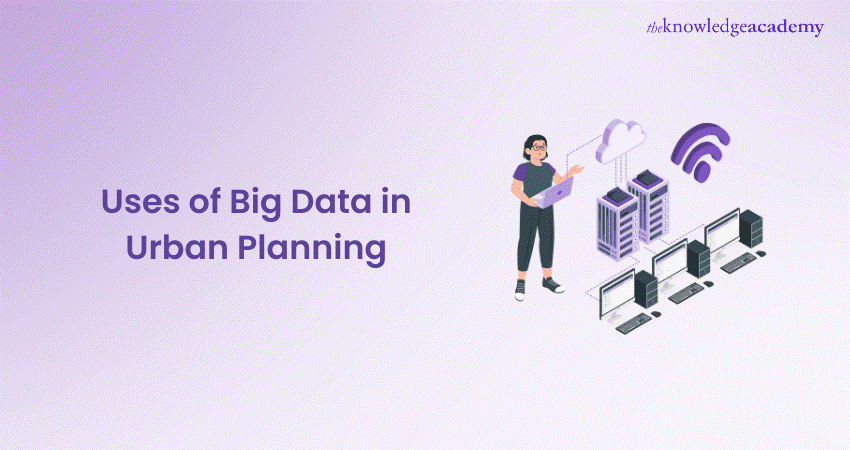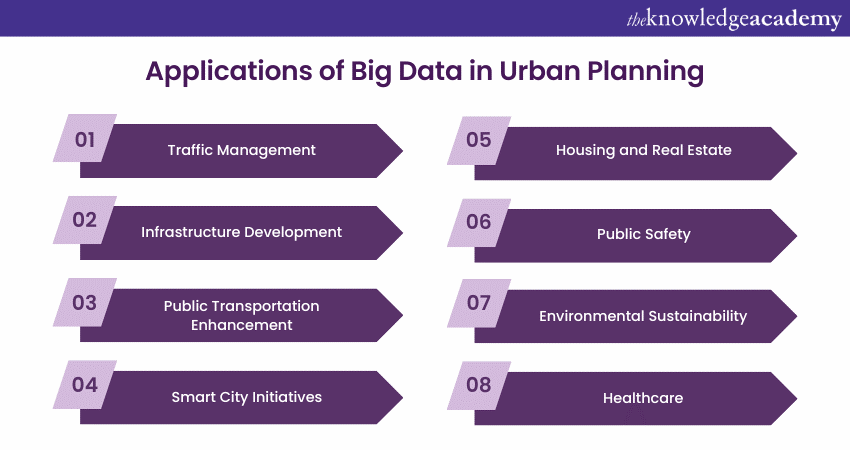We may not have the course you’re looking for. If you enquire or give us a call on +40 316317743 and speak to our training experts, we may still be able to help with your training requirements.
Training Outcomes Within Your Budget!
We ensure quality, budget-alignment, and timely delivery by our expert instructors.

Imagine a city that anticipates traffic congestion before it happens, designs public spaces to maximise community engagement, and reduces energy consumption through data-driven insights. This isn’t the future—it's the present, thanks to the power of Big Data in Urban Planning. As cities grow and evolve, urban planners are increasingly turning to Big Data to make informed decisions that enhance efficiency, sustainability, and quality of life.
By harnessing vast amounts of data from sensors, smartphones, and public records, planners can create smarter, more responsive cities. Let’s explore how Big Data in Urban Planning is revolutionising Urban Planning and shaping the cities of tomorrow.
Table of Contents
1) What is Urban Planning Data?
2) What are the Uses of Big Data in Urban Planning?
3) Smart Cities and Urban Analytics
4) What Data is Used in Urban Planning?
5) Conclusion
What is Urban Planning Data?
Urban Planning Data has information related to different aspects of cities, such as population, land usage, transportation, infrastructure, environment, and socio-economic elements. Urban planners and policymakers utilise this data to make informed decisions and develop strategies for sustainable urban growth.
Some examples of Urban Planning Data include population demographics, land use patterns, transportation infrastructure, environmental conditions, and economic indicators. This data supports assessing present urban conditions, finding out patterns, and directing city development and policy decisions.
What are the Uses of Big Data in Urban Planning?
Let’s understand different applications of Big Data in the domain of Urban Planning.

1) Traffic Management
In Urban Planning, Big Data has transformed traffic management significantly. City officials can now swiftly monitor and respond to traffic conditions using real-time data from sources like traffic cameras, GPS devices, and mobile apps.
Predictive analytics help anticipate congestion and accidents, allowing for proactive actions such as rerouting and adjusting traffic signals. By effectively managing traffic flow, cities can decrease gridlock, reduce emissions, and improve the overall commuting experience for residents.
2) Infrastructure Development
Big Data empowers cities to make informed decisions about infrastructure development. By analysing data on population growth, usage patterns, and wear and tear, city planners can identify areas that require immediate attention and prioritise infrastructure projects accordingly. Data Analysis enables predictive maintenance, ensuring efficient resource allocation, extending the lifespan of critical assets, and reducing costs.
Unlock the power of Big Data Analysis and elevate your skills with our comprehensive Big Data Analysis Training Course!
3) Public Transportation Enhancement
Efficient public transportation is vital for urban mobility and sustainability. Big Data aids in enhancing public transit by providing insights into passenger behaviour, usage patterns, and demand fluctuations. This data enables transportation authorities to optimise routes, schedules, and capacity allocation, leading to improved service quality and reduced environmental impact.
4) Smart City Initiatives
Big Data forms the foundation of smart city initiatives, where data from various sources, including sensors, IoT devices, and social media, is harnessed to improve urban living. These initiatives encompass a wide range of applications, from energy efficiency and waste management to urban security and citizen engagement. By utilising data, smart cities create more efficient, sustainable, and responsive urban environments.
5) Housing and Real Estate
The housing market benefits significantly from Big Data insights. Data Analytics helps city planners identify trends in housing demand, property values, and rental rates. This information is invaluable for addressing issues like affordable housing and urban sprawl. Moreover, predictive models can assist in making informed decisions about zoning and land use, fostering balanced and equitable Urban Development.
6) Public Safety
Big Data plays an important role in enhancing public safety in urban areas. By analysing historical crime data, city authorities can predict crime hotspots and allocate resources accordingly. Additionally, data-driven emergency response systems improve disaster preparedness and ensure more effective responses during crises, ultimately safeguarding the well-being of urban populations.
Level up your data science expertise and harness the power of Big Data Analytics with our Big Data Analytics & Data Science Integration Course!
7) Environmental Sustainability
Environmental sustainability is a pressing concern for cities worldwide, and Big Data offers essential tools for mitigating urban environmental challenges. Through air quality monitoring, waste management optimisation, and green space planning, urban planners can reduce pollution, conserve resources, and create healthier, more liveable urban environments.
8) Healthcare
Access to healthcare is a necessary aspect of urban living, and Big Data supports healthcare planning in several ways. It aids in identifying healthcare deserts and ensuring equitable distribution of medical facilities. Additionally, Data Analysis helps track disease outbreaks, predict healthcare needs, and optimise the allocation of healthcare resources, promoting overall public health in urban areas.
Smart Cities and Urban Analytics
Urban Analytics are utilised in smart cities to improve city management, infrastructure, and overall quality of life. They generate an up-to-the-minute comprehension of city dynamics by combining data from sensors, devices, and urban systems. This information assists in better managing traffic, energy consumption, waste, and public services.
Urban Analytics involves analysing large quantities of data from different sources such as public transportation, environmental sensors, and social data. This assessment helps with maximising resource distribution, decreasing ecological footprints, and enhancing sustainability as a whole.
Data-based traffic control systems can decrease traffic jams and pollution, and intelligent power grids can enhance electricity distribution.
In addition to this, Urban Analytics can perform predictive modelling to anticipate future expansion and find possible emergencies. It enables urban planners and policymakers to take the right decisions to make impactful urban development strategies.
Smart cities can encourage connections between individuals to lead a safer and cleaner city environment. It also improves the lives of residents by adopting cutting-edge technologies.
What Data is Used in Urban Planning?
Urban Planning depends on a variety of data sources to design cities that are sustainable, efficient, and dynamic. This data leads decision-making and aids planners in creating urban spaces that cater to residents and businesses. Take a glimpse at the kinds of data typically utilised in Urban Planning.

1) Data on Demographics
It is important to understand the characteristics of the population for successful Urban Planning. Demographic data consists of details on age, gender, income levels, education, and family composition. This data assists planners in recognising the requirements of various community segments, like the necessity for affordable housing for lower-income families or playgrounds for kids.
2) Land Use Data
Data on land use shows the current allocation of urban space for residential, commercial, industrial, and recreational purposes. Examining patterns of land use assists planners in evaluating resource distribution and pinpointing regions for either redevelopment or conservation efforts.
3) Transportation Data
Data on transportation includes details on current infrastructure, traffic flows, use of public transportation, and paths for pedestrians and cyclists. This information helps enhance mobility, alleviate traffic, and provide accessible transportation choices for all inhabitants.
4) Environmental Data
Urban planners need to consider environmental aspects like air pollution, noise pollution, water availability, and parks. Environmental information assists in evaluating how urban growth affects natural habitats and ensures that sustainable practices are prioritised in planning activities.
5) Economic Data
Effective Urban Planning requires a thorough understanding of the city's economic structure. Economic data consists of statistics on employment rates, business locations, and conditions of the local economy. This data aids in creating plans to promote economic growth and draw in investment.
6) Social Data
Social data comprises data on community involvement, levels of crime, public health, and education. Through an understanding of social dynamics, planners can design environments that support the safety, inclusivity, and well-being of every resident.
7) Infrastructure Data
This data includes details on utilities such as water supply, sewage systems, and energy distribution. Examining data on infrastructure assists planners in pinpointing areas that require improvements or expansion to cater to growth.
8) Geographic Information Systems (GIS)
GIS technology combines different data formats into visual maps, enabling planners to examine spatial connections and trends. This tool is extremely useful for viewing data and making smart choices regarding urban development.
Urban Planning is dependent on a wide variety of data types such as demographic, land use, transportation, environmental, economic, social, and infrastructure data. Urban planners can develop successful strategies to improve city life and tackle urbanisation challenges by utilising this information.
Conclusion
The role of Big Data in Urban Planning is vital for influencing the future of urban environments. With the ongoing increase in urban populations, it will be crucial to utilise Big Data to tackle issues like traffic congestion, environmental impact, and resource allocation. Adopting these cutting-edge technologies will enhance residents' quality of life and open the door for creative solutions in urban development.
Take your data analysis skills to new heights with our cutting-edge Big Data and Analytics Training Courses!
Frequently Asked Questions

Other types of data like Urban Planning Data are transportation data, environmental data, economic data, and demographic data. These categories offer a way to understand the dynamics of a city, aiding planners in evaluating infrastructure requirements and grasping community demographics to make informed decisions.

Big Data contributes to the advancement of smart cities by offering an immediate understanding of urban systems. It enhances the management of resources, enhances public services, and guides decision-making. Through the analysis of large datasets, cities can improve traffic, lower energy usage, and predict citizen requirements.

The Knowledge Academy takes global learning to new heights, offering over 30,000 online courses across 490+ locations in 220 countries. This expansive reach ensures accessibility and convenience for learners worldwide.
Alongside our diverse Online Course Catalogue, encompassing 19 major categories, we go the extra mile by providing a plethora of free educational Online Resources like News updates, Blogs, videos, webinars, and interview questions. Tailoring learning experiences further, professionals can maximise value with customisable Course Bundles of TKA.

The Knowledge Academy’s Knowledge Pass, a prepaid voucher, adds another layer of flexibility, allowing course bookings over a 12-month period. Join us on a journey where education knows no bounds.

The Knowledge Academy offers various Big Data and Analytics Training, including Big Data Analysis, Advanced Data Analytics Course, and Big Data and Hadoop Solutions Architect Course. These courses cater to different skill levels, providing comprehensive insights into What is Data Cleaning.
Our Data, Analytics & AI Blogs cover a range of topics related to Big Data, offering valuable resources, best practices, and industry insights. Whether you are a beginner or looking to advance your Data Analysis skills, The Knowledge Academy's diverse courses and informative blogs have got you covered .skills, The Knowledge Academy's diverse courses and informative blogs have got you covered.
Upcoming Data, Analytics & AI Resources Batches & Dates
Date
 Hadoop Big Data Certification
Hadoop Big Data Certification
Thu 12th Dec 2024
Thu 23rd Jan 2025
Thu 20th Mar 2025
Thu 22nd May 2025
Thu 17th Jul 2025
Thu 18th Sep 2025
Thu 20th Nov 2025







 Top Rated Course
Top Rated Course



 If you wish to make any changes to your course, please
If you wish to make any changes to your course, please


